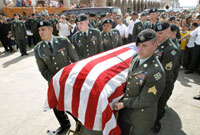 Analysts say steady rise in US military deaths in Iraq has contributed to erosion in US public support for war.
Analysts say steady rise in US military deaths in Iraq has contributed to erosion in US public support for war.
by Jim Mannion
The US military death toll in Iraq reached 2,500 Thursday, moving like a shadow behind President George W. Bush’s efforts to gain momentum from last week’s burst of good news from the war-torn country.
Lieutenant Colonel Jeremy Martin said the latest combat death of US marine raised the overall toll for Operation Iraqi Freedom (OIF) to 2,500, including 1,972 service members killed in action.
“Each and every loss is felt hard by our nation, by the units from which those individuals come, and certainly mostly by their families,” said Brigadier General Carter Ham, deputy director of the Joint Staff for regional operations.
“Rather than focus on an aggregate number, I think it is more important for us to remember that there are individuals in that aggregate number and those individuals are those to whom we should feel very, very grateful,” he said…
But the steady rise in US military deaths and the impact of individual deaths on communities around the country has contributed to an erosion in public support for the war in the United States, analysts say.
A USA Today/Gallup poll last week found that 53 percent of Americans believe things are going badly in Iraq, up from 38 percent in March. Fifty one percent believe Washington made a mistake in sending troops into Iraq, against 46 percent who said it had not.
“At one broad level, the death toll has clearly influenced the basic way we see the war,” said Michael O’Hanlon, a military expert at the Brookings Institution, a Washington think tank.
“It’s first and foremost why Americans don’t think as positively about this war as they once did. In that sense it’s critical,” he said.
“In another sense it’s not what is going to dictate future policy. What’s going to dictate future policy of the war is going to be if there is any sign of progress.”
The US administration got a rare break on that score over the past week with the killing of the Al-Qaeda leader in Iraq, Abu Musab al-Zaraqwi, and the end of a paralyzing, months-long struggle to form a new Iraqi government.
Bush sought to capitalize on those gains with a surprise trip to Baghdad this week, while making it clear to Americans at home that an open-ended US military involvement remains crucial to success in Iraq.
US Defense Secretary Donald Rumsfeld, who has complained that the long delay in forming a new government had cost US lives, said discussions will be held with Iraq’s new leaders on the pace of a possible drawdown of US forces.
“The conditions on the ground will determine it,” he told reporters Tuesday, noting that US commanders would bring in more troops if they were needed, just as they did while Iraqi Prime Minister Nuri al-Maliki was forming his new cabinet.
General George Casey, the top US commander in Iraq, was to have made recommendations on future US force levels by June 21 but Ham said that has been delayed.
Pentagon officials said there were 127,000 troops in Iraq on Wednesday, a dip in force levels that they attributed to the ebb and flows of troop rotations, not a deliberate decline.
The US military, meanwhile, has reported no let up in the danger to US forces from insurgent and sectarian violence. The violence has worsened this year despite the expansion of Iraqi security forces, widely viewed as the US ticket out of Iraq.
Ham said attacks with improvised explosive devices, the number one killer of US troops, are up even though some 45 percent are detected and stopped before they explode.
The daily toll of US combat deaths has nevertheless receded as an issue since last summer, when Cindy Sheehan, the mother of a soldier who was killed in Vietnam, galvanized opposition to the war with a vigil outside Bush’s Texas ranch.
“People are not adjusting their thinking about Iraq too much from week to week or month to month,” said O’Hanlon.
“It’s already been accepted that this has been a bloody, messy war with a much more uncertain situation than we had hoped, and much greater loss of life than we had hoped or expect,” he said.
“So the death toll is a huge problem at one level. On another level Americans are not showing a fundamental lack of resolve.”
ATTENTION READERS
We See The World From All Sides and Want YOU To Be Fully Informed
In fact, intentional disinformation is a disgraceful scourge in media today. So to assuage any possible errant incorrect information posted herein, we strongly encourage you to seek corroboration from other non-VT sources before forming an educated opinion.
About VT - Policies & Disclosures - Comment Policy



